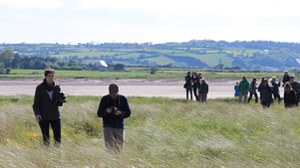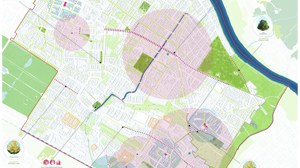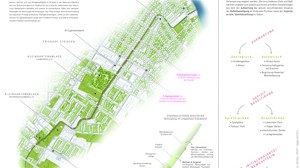Studying at the Chair of Landscape Planning
For the development of municipalities, regions and federal states there is the multi-level system of spatial planning and correspondingly that of subject specific planning. Landscape planning makes specific contributions in these systems with, on the one hand, a comprehensive cross-sectional, partially coordinating and, on the other hand, a sectoral character. Formal plans are meanwhile often supplemented by informal ones, whose process character and project orientation place further demands on landscape planning contributions. Landscape is always understood as a whole: as an area perceived as such by humans, whose character is the result of the interaction of natural as well as anthropogenic factors (Article 1 of the European Landscape Convention). In this respect, it is important to explore both the natural and the social conditional structures of landscapes... To learn to read landscapes... To make well-founded decisions about what should be preserved and what should be changed... And to think up and implement creative ideas and projects for future landscape development! The landscape planning education in the study program Landscape Architecture at the TU Dresden is dedicated to these challenges.
 © TU DD, Lapla
© TU DD, Lapla
Teaching profile landscape planning
The best way to learn how to plan landscapes at different scales and in different contexts is to do it yourself. Against this background, based on an initial overview of the content-related topics, tasks and instruments of landscape planning in the context of spatial planning, work in the 3rd semester is primarily project-oriented: In the landscape planning project of the 4th semester, for example, a landscape plan is developed for a concrete processing area. The students learn which methods can be used to analyze and evaluate environmental assets such as soil, climate, water, biodiversity, landscape form and recreation, as well as cultural landscape, and to develop target concepts for these, and how an integrated landscape development concept can be created by comparing the targets of all environmental assets. These planning "tools" are also required for all other instruments. In the 5th semester there is the possibility of deepening in an elective module, in which landscapes are explored or also in landscape communication the view of the people on their landscape is explored. To write the bachelor thesis in landscape planning means to work on a freely chosen, individual topic in terms of design, planning or/and science.
Building on the competencies in the bachelor's degree, the master's degree "Landscape Architecture" is divided into two semesters in which students learn about the various other instruments such as environmental assessment, impact regulation, special species protection, FFH impact assessment and contributions to overall spatial planning and try them out in simulation games. In addition, semester projects on current topics in landscape planning are offered each semester, which can be chosen from the entire range of courses offered by the institute. Elective modules, excursions and the possibility to write the master's thesis on a landscape planning topic complete the offer.


